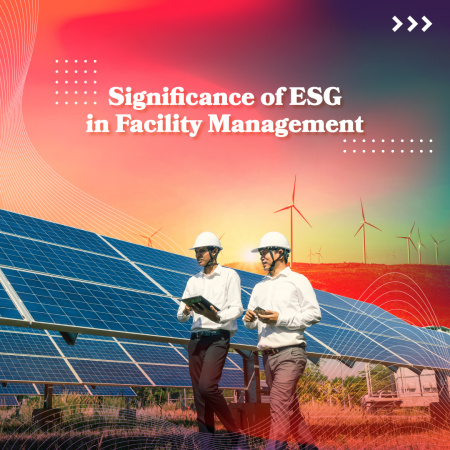The Rising Significance of ESG in Facility Management

In recent years, Environmental, Social, and Governance (ESG) factors have gained increasing prominence across industries as a measure of sustainable and responsible business practices. The facility management industry, with its significant impact on environmental and social aspects, has embraced ESG as a guiding framework. In this blog post, we will explore the importance of ESG in facility management and how it drives sustainability and stakeholder value.
Understanding ESG:
First, we will provide an overview of ESG and its three pillars: Environmental, Social, and Governance. We will explain how each pillar encompasses various factors, such as environmental impact, community engagement, employee welfare, diversity and inclusion, ethical business practices, risk management, and corporate governance.
Environmental Impact and Sustainability:
Under the environmental pillar of ESG, facility management plays a critical role in promoting sustainable practices. We will discuss initiatives related to energy efficiency, waste management, water conservation, renewable energy adoption, green building certifications, and carbon footprint reduction. Furthermore, we will explore the integration of sustainability metrics and targets within facility management strategies.
Social Responsibility and Stakeholder Engagement:
The social pillar of ESG focuses on the impact of facility management on employees, communities, and society at large. We will discuss initiatives related to health and safety standards, employee well-being programs, fair labour practices, community outreach, supply chain management, and stakeholder engagement. Additionally, we will highlight the importance of transparent communication and accountability in fostering positive social outcomes.
Governance and Ethical Business Practices:
Governance, the third pillar of ESG, encompasses principles of transparency, accountability, and ethical behaviour. We will explore how facility management companies can ensure strong corporate governance, effective risk management, compliance with regulations, and ethical decision-making. We will also discuss the role of robust governance frameworks in maintaining stakeholder trust and attracting investors.
ESG Reporting and Metrics:
To effectively measure and communicate ESG performance, standardized reporting frameworks and metrics have emerged. We will delve into widely adopted reporting frameworks, such as the Global Reporting Initiative (GRI) and the Sustainability Accounting Standards Board (SASB), and discuss the importance of collecting and analysing relevant data to track progress and demonstrate ESG commitments.
Benefits and Business Value of ESG:
Implementing ESG practices in facility management brings tangible benefits to organizations. We will explore the potential advantages, including improved operational efficiency, cost savings, enhanced brand reputation, attraction, and retention of talent, reduced regulatory risks, and access to sustainable investment opportunities. We will also highlight case studies showcasing successful ESG integration in facility management.
ESG has become a critical consideration for the facility management industry, aligning sustainability goals with business objectives and stakeholder expectations. By embracing ESG principles and implementing sustainable practices, facility management professionals can drive positive environmental and social change, enhance stakeholder value, and contribute to a more sustainable future.

